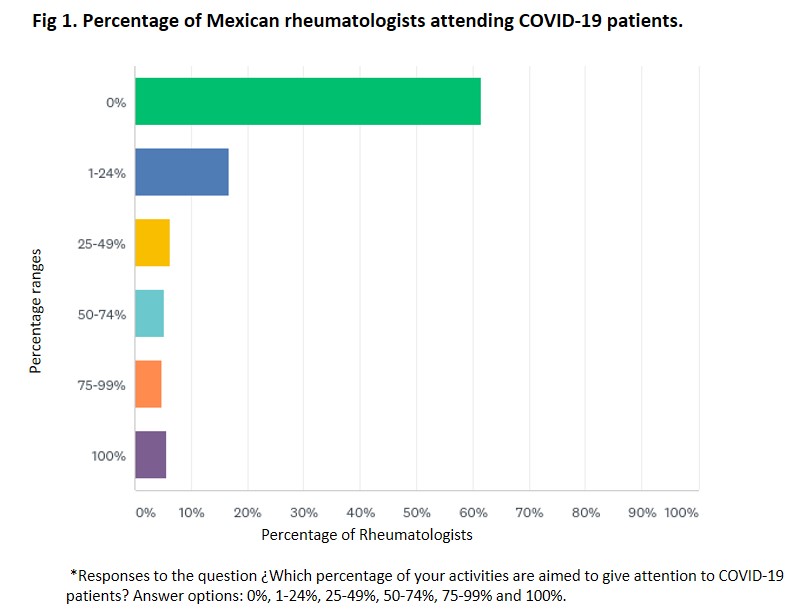Session Information
Session Type: Poster Session B
Session Time: 9:00AM-11:00AM
Background/Purpose: COVID-19 pandemic is an evident challenge for healthcare systems and daily clinical practice in developing countries. Particularly, chronic diseases attention has faced difficulties. The Mexican College of Rheumatology (MCR) is a professional membership organization committed to helping the development, communication of knowledge, and the improvement for the care of patients with rheumatic diseases, with 619 active members from the 32 regions in Mexico. We aimed to explore the impact of COVID-19 pandemic on the rheumatology practice among MCR members.
Methods: An anonymous web-based survey was developed and distributed via social media groups and e-mail to all members of the MCR from May 14th to June 12th, 2020. The survey included 27 questions exploring sociodemographic aspects, the impact of the pandemic in rheumatology practice and, the economic impact for the Mexican rheumatologists. Descriptive statistics were used.
Results: A total of 239 respondents from 24 regions of Mexico completed the survey. By gender, 130 (54.4%) were women and 109 (45.6%) men. The median (IQR) age was 46 years (36-56). Rheumatologist practice was private only in 82 (34.3%) of cases, public only in 8 (4.4%), and both in 144 (60.3%); 5 rheumatologists (2.1%) did not have clinical practice. Among those with private practice, 147 (84.0%) reported a reduction of more than 50% in the number of patient visits and 27 (12.4%) closed their practice. The main protective measures used in private practice were increasing hygienic measures (83.2%) and reducing the number of patients by hour/day (63.1%). Rheumatologist reported expenses in more than 25% of their total income to implement protective measures in their practices in 34.4% of the cases. Different online platforms were used by 76.3% rheumatology specialists, 80% reported they have reduced their fees and 14.1% did not charge when giving online consultation. Those having public practice, 118 (82.9%) reported a reduction of more than 50% in the number of patient visits and 43 (29.9%) did not give rheumatology consultations anymore. The reduction of more than 50% of consultations number was not associated with age neither in private, nor in public practice (p=0.25 and p=0.53, respectively) and no association with gender was found (p=0.52 and p=0.30, respectively). Most of the rheumatologists working in public practice (83.3%) have bought themselves the protective equipment needed. Of all rheumatologists who answered the survey, 15.7% reported more than 50% of their activities were aimed to see patients with COVID-19, and 11 (5.1%) had been diagnosed with the disease.
Conclusion: The survey shows the negative impact in the Mexican rheumatology clinical practice of COVID-19 outbreak with the reduction of overall public and private consultations and supports the need to establish appropriate measures to keep the attention of patients with rheumatic diseases during COVID-19 pandemic.
To cite this abstract in AMA style:
Ruiz N, Ruiz Guizar J, Zamora Tehozol E, Colunga Pedraza I, Hernández-Díaz C, Rivera-Terán V, Pacheco Tena C, Alpizar-Rodriguez D. Impact of COVID-19 Pandemic on the Rheumatology Practice in Mexico: Mexican College of Rheumatology Survey [abstract]. Arthritis Rheumatol. 2020; 72 (suppl 10). https://acrabstracts.org/abstract/impact-of-covid-19-pandemic-on-the-rheumatology-practice-in-mexico-mexican-college-of-rheumatology-survey/. Accessed .« Back to ACR Convergence 2020
ACR Meeting Abstracts - https://acrabstracts.org/abstract/impact-of-covid-19-pandemic-on-the-rheumatology-practice-in-mexico-mexican-college-of-rheumatology-survey/

